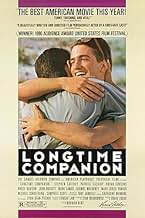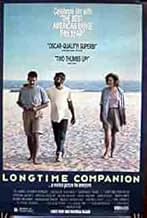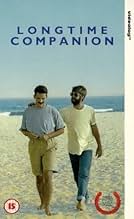AVALIAÇÃO DA IMDb
7,6/10
6,4 mil
SUA AVALIAÇÃO
Adicionar um enredo no seu idiomaThe emergence and devastation of the AIDS epidemic is chronicled in the lives of several gay men living during the 1980s.The emergence and devastation of the AIDS epidemic is chronicled in the lives of several gay men living during the 1980s.The emergence and devastation of the AIDS epidemic is chronicled in the lives of several gay men living during the 1980s.
- Indicado a 1 Oscar
- 6 vitórias e 6 indicações no total
Avaliações em destaque
Longtime Companion chronicles the lives of a group of gay men during the 1980s. The focus of the film is AIDS, unknown to the men when the film opens in 1981, but by the end of the story in 1989, it has become the central defining event in the lives of the survivors. Shot in almost documentary style the story is told almost matter-of-factly. But the reality of the lives of the men in the story is not matter-of-fact; they are dying and dying in the prime of their lives. It's heart-rending. In this, the movie succeeds very well, raising awareness of the effects of AIDS, and putting a human face to its victims.
When I watched this for the first time, I like many that went through this time period, identified with most of the characters in this movie at one time or another. I had my sister watch this movie (a devoted Pentecostal) she said it was the sadist thing she had ever seen. I felt that she got the message, Gay or Straight, this was a tragedy that had happened to everyday people, and still is happening, and not just to "those people". She, like many, never wanted to see past the homosexual thing. With this film she saw a clip of life, albeit a condensed version, of how something so out of control entered, affected and was handled by people like herself both gay and straight. I told her that was the way it I felt it was for many of us dealing with this disease that had taken so many of my friends and colleagues. I also liked how this movie didn't victimize, or make a villain out of any of the characters nor did it make anyone a saint either. I felt the topic was handled with good taste, considering how it was something most people didn't want to think about. With the majority of the audience being straight and secure in the fact that this only happened to other people who were deserving of what they got. I also felt that this movie showed the truth although a bit Hollywood and too polished (not a docudrama, definitely a movie) it did a good job of making a difficult subject much more palatable and sympathetic to folks that had never had it happen to them or to those they love. The progression of the movie conveyed the feeling most had in regards to how fast things happened. One day someone was here the next they were gone. I also felt that the actors, many non gay, did brilliant performances not playing stereotype's but keeping it real as it should be. Since most gay men and women I know don't act all that different from everyone else. I for one am tired of gays being portrayed as only hair stylist and drag queens, much as I am sure African-Americans were tired of their stereotypes of only being the hired help or as ignorant simpletons. This was not the best movie I have ever seen, but I feel it is one of the best dealing with this subject matter. The end of this movie still gets to me, every time I see it, if only that could happen like that, I too "just want to be there"
A landmark film, not only in that it is the first film to deal with the AIDS crisis, but also in its portrayal of gay men and their friends. Sitting on the cusp between earlier depictions of gays as murderous or suicidal and later caricatures of funny, sexless "best friends", the men shown here are very real and very honest in their decade long struggle with death and illness. I defy you to watch Bruce Davison's heartbreaking farewell speech and not be choked up on some level of emotion. And Mary Louise Parker add a special touche. This movie has arguably the greatest final scene in gay cinema.
Blondie's hit record opens this early AIDS film, a kneejerk reaction to the hysteria that was happening in the world in the wake of so many deaths from what was still viewed as 'the gay plague'.
'Longtime Companion' centres on a group of friends who are affected by AIDS in various different ways - two are victims of the disease, while others survive to remember their friends with affection. There are one or two stereotypes here (the camp Fuzzy, who mimes to disco records), but in the main the characters are played with sensitivity (and a degree of humour): Bruce Davison, Mark Lamos, and Campbell Scott stand out from a good cast.
I particularly liked the moving and celebratory ending, a surreal segue which brings everyone together in a huge, joyous beach party where everyone is alive, in love, and together. This single scene says more about the effects of the AIDS epidemic than many other right-on scenes from more traditional films.
'Longtime Companion' centres on a group of friends who are affected by AIDS in various different ways - two are victims of the disease, while others survive to remember their friends with affection. There are one or two stereotypes here (the camp Fuzzy, who mimes to disco records), but in the main the characters are played with sensitivity (and a degree of humour): Bruce Davison, Mark Lamos, and Campbell Scott stand out from a good cast.
I particularly liked the moving and celebratory ending, a surreal segue which brings everyone together in a huge, joyous beach party where everyone is alive, in love, and together. This single scene says more about the effects of the AIDS epidemic than many other right-on scenes from more traditional films.
I was a physician in New York City from 1989 until 1992, and saw a tremendous number of people with AIDS. I feel that this movie, although it may appear to be dated, is an excellent portrayl of events that were all too common at that time. It gives a good sense of the confusion, misinformation, sense of being lost, and of not knowing what to do for those suffering and for their friends and companions. The actors did an excellent job in showing this. I believe that this movie is still important and merits being shown often.
Você sabia?
- CuriosidadesThe title refers to the only way that newspapers at the time would allow a gay man's lover to be listed in an obituary.
- Erros de gravaçãoIn the segment marked "July 3, 1981" people dance to the song "Do You Wanna Funk?" by Sylvester, but this song was not released until 1982.
Principais escolhas
Faça login para avaliar e ver a lista de recomendações personalizadas
Detalhes
- Data de lançamento
- País de origem
- Idioma
- Também conhecido como
- Longtime Companion
- Locações de filme
- Empresas de produção
- Consulte mais créditos da empresa na IMDbPro
Bilheteria
- Orçamento
- US$ 3.000.000 (estimativa)
- Faturamento bruto nos EUA e Canadá
- US$ 4.609.953
- Fim de semana de estreia nos EUA e Canadá
- US$ 50.525
- 13 de mai. de 1990
- Faturamento bruto mundial
- US$ 4.609.953
Contribua para esta página
Sugerir uma alteração ou adicionar conteúdo ausente

Principal brecha
By what name was Meu Querido Companheiro (1989) officially released in India in English?
Responda

































